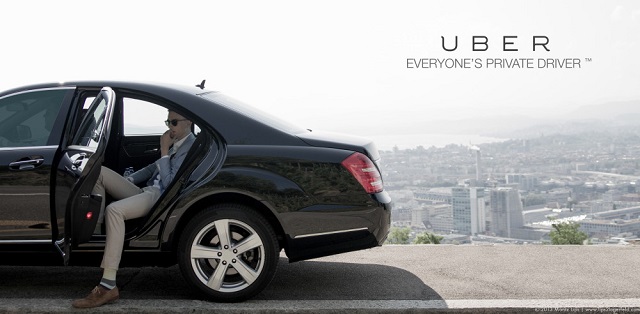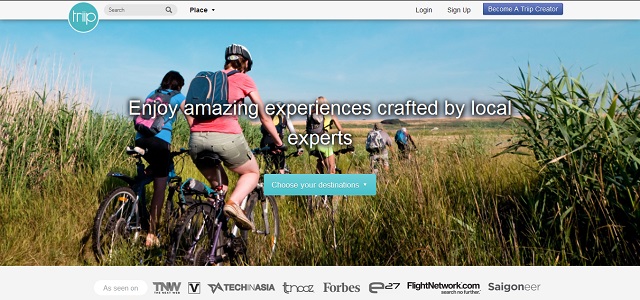|
Collaborative consumption starts up in Vietnam with Uber, Airbnb, Triip.me |
|
Update: 18:08, Monday, Sep 01,2014 (GMT+7)
|
|
Collaborative
consumption (aka “the sharing economy” or “peer to peer”) is a broad
term used to describe the shared creation, supply and consumption of
goods and services. Typically it involves the use of technology
platforms (usually the internet) to link supply and demand, enabling
supply-side and demand-side to share resources and capacity in an
efficient way. It's considered to bring high economic value and quite an
impact on the consumers as well as traditional enterprises.
|
Uber provides Vietnam with a touch of luxury, low fares
Since
June 2014, local and foreign passengers in Ho Chi Minh City have
enjoyed the luxury and convenience of Uber, an American taxi service
that offers expensive vehicles, which gives passengers the feeling of
riding in their own lavish cars.

It only takes a few swipes on a
smartphone for clients to start up their Uber app, pick a car, and
select the location where they wish to be picked up. The app instantly
tells them that a car with a specified license plate will arrive in
10-15 minutes and also provides them a photo of the driver. The
passengers can also track the car on their phone. Uber cars have no
markings on the outside to show that they are rented.
Uber, which
is based in San Francisco, was launched in 2009 and offers a mobile app
connecting passengers and its cars. The company has faced significant
resistance from regulators in America and Europe, as well as protests
from taxi operators, who claim the service is unfair competition and
fails to meet the standards set for such services. Uber operates in 36
countries in the Americas, Europe, Africa, Asia, and Australia.
Each
car is equipped with an iPhone, attached to the windshield, so that
drivers can receive messages from clients, road directions, and
calculate fares. The fares are relatively low, compared to those offered
by local taxi operators. But one limit to the use of Uber services in
Vietnam’s cash-preferring market is that fares are debited from clients’
credit cards, while cash is not accepted. As soon as the car stops and
the driver swipes on the iPhone to mark the end of the journey, an email
with a bill and detailed record of the trip is sent to the clients’
phone.
Taxi-hailing apps, including GrabTaxi, Easy Taxi, Tappxi
and myTaxiControl, are racing to lure clients in Vietnam. Taxi locater
and booking apps allow people to find the nearest available cabs and
arrange a ride with a driver based on information regarding the distance
and fare calculated by software, thanks to GPS technology. The whole
trip will then be constantly updated in real time via Google Maps on the
app, erasing the fear of customers that they will be cheated by the
drivers on longer routes.
Taxi drivers also say they benefit from
the apps, as they know where their customers are and do not have to
worry about having them ‘stolen’ by other cabbies. Some drivers also say
that with the apps, they have received more passengers than they did
previously.
Airbnb offers unique accommodations from local hosts in 190 countries to its travellers
Airbnb
is a startup that lets users seek out non-hotel travel accommodations
listed by other hosts. Users all over the world can post spaces
available for rent; in turn, Airbnb allows customers to rent out those
spaces, which could be available anywhere from a couple of days to a
month. Another advantage of Airbnb is that homeowners can help plan to
go or places leads us to places only the locals know.

This
startup makes money by charging a transaction fee for each successful
booking. Airbnb has been invested $ 500 million from new investors,
bringing the company's value up to $ 10 billion, not inferior to the
giants Hyatt and Accor. Airbnb is also particularly loved by foreign
tourists for not only providing a high quality place to stay at a
cheaper price compared to ordinary hotel, but also creating a chance for
tourists exchange their cultural knowledge and experience as a truly
indigenous.
After Thailand, Malaysia and Singapore, Vietnam could
be the next destination of this online sharing rental services. Airbnb
has supported VND currrency, and started to recruit local person to
connect to the hosts as well as do customer care in Vietnam, prepare for
the first step to enter this potential market.
Triip.me - Impression of Vietnamese start ups
Triip.me
is a tourism service development based on community resources, turns an
ordinary Vietnamese local into an amateur tour guide overnight.
Allowing anyone to create a tourism package and sell in to tourists on
their website and iPhone app, this start ups has also released Wiki
Triip, which combines information online about various Vietnamese
destinations into one smartphone app. Currently, Triip.me has more than
1870 tours to 21 countries and 55 cities across Asia, in which 500 has
been published on the website.

10% total gross amount of each
tour booking contributed most of Triip.me's income in the first opening
period. Future goals of Triip.me are improving the safety for its users
as well as becoming a global provider for uniquely indigenous tourism
experiences.
A.K.
|
|
View:
3264 |
| Tags: Uber, Airbnb, Triip, me, Sharing economy, Collaborative consumption |
|
|
|
|
Exchange USD |
|
Updated on April 20, 2022
| BSP |
Bank (Vietcombank) |
23.070 VND
|
23.100 VND
|
|
|
|